Graham Reid | | 6 min read
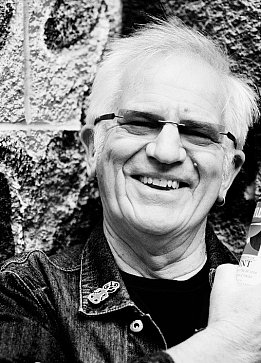
Christchurch-based writer Jeffrey Paparoa Holman was born In London but from the age of 10 was raised on the West Coast, has published a number of books of poetry and prose (he profiled his excellent memoir of his father The Lost Pilot in 2013 for us), is a senior adjunct fellow at the University of Canterbury and has written for Elsewhere about Bowie, birds and the bard of the public bar (Sam Hunt) in the past.
Our kind of Elsewhere/elsewhere guy.
So when he said he had a book of poems entitled Dylan Junkie (dedicated to the late C'mon and radio host Pete Sinclair we note with approval) we were keen to read it. Because it was about Dylan's music but also not always. It was about his impact on us, and him.
We've written about the book and so feel it very timely that Jeffrey should be invited to answer our specially constructed Famous Elsewhere Writers Questionnaire . . .
The first book which really affected you was . . .
Really got to me, like not Jim Corbett's Man Eaters of Kumaon or Gerald Durrell's My Family and other Animals? I guess it would be an old League of Nations book, No More War, that one of my Fifth Form mates brought to Greymouth High School and showed us all, kind of undercover in the gym changing room.
It had all these terrible photos of men wounded and maimed by injuries in the Great War. Not just limbs missing, but half their faces gone in some of the pictures. It shocked me. I never forgot those images and I think it grew me up, about all the war games we'd played as kids.
Your first (possibly embarrassing) unpublished literary effort was . . .
Some handwritten early poems from 1970-71 that I showed to my American Studies lecturer, the poet David Walker, after a tutorial. He kindly handed them back a week later with comments, "flush out the rose with last night's bathwater", then "I think of Mandelstam who spent an entire evening trying to persuade a non-poet into non-poem", followed by "Clever - beware of cleverness", and finally, "If more means less, then less!"
Most people would have given up then, but the literary ego is huge and strong even at its most vulnerable. We went on to be published together and become lifelong friends. I visited David in Maine in 1987 and we remained in touch till his death in 2008.
Do you have any rituals or habits when you are in the throes of writing?
Drinking coffee is the good amigo and social media the bad hombre. I try and switch distractions off when it's time to get down and dirty.
If writing was denied you, your other career choice would be . . .
As a kid, I drew all the time, telling stories visually, so I might go back to drawing and painting. On wet days on the Coast (West, of course, South Island) me and my brother would spread swathes of white butcher's paper on the kitchen table and draw collages, panoramas (yes, lots of wars). I was mad on flight, so got to be a pretty dab hand at WW2 planes, Spitfires and Hurricanes drawn from all angles. I copied portraits of the Queen and Prince Philip from the Woman's Weekly (my options were limited).
Once I got to the Fifth Form epiphany above, I was copying things like the exhausted face of a German soldier in 1945 and titling it "Defeat". That would have been my Sixth Form year. I remember I pinned it to the wall in the sitting room. I took a lot of photos on my Box Brownie and still like snapping pics.
Drawing to me - and photography - it's all about observing and framing, so it's great for writers. Flannery O'Connor said that. Elizabeth Bishop said something like, the trouble with most men (writers) is that they have ideas but don't "see things".
Three books (yours, or by others) you would love everyone to read are . . .
A recent discovery, Schlump, by Hans Herbert Grimm (2014), a spellbinding anti-war novel first published in Germany in 1928 and later suppressed by the Nazis. Here is war from the other side, a deeply human story (our man joins up to meet girls and dodges front line service until they catch up with him in France and he gets his taste of hell). Essential: we see the effect on the starving civilians on the home front, where my great aunt Lily was throughout the war, married to a German rubber company manager. Humanises the enemy.
I rate W. G. (Max) Sebald (1944-2001) as one of the greats and if you read no other, Austerlitz (2001) is a masterpiece, examining the survival of memory and its suppressions, tracking at one remove the life of the eponymous hero, a Czech Jewish boy who caught the last Kindertransport out of Prague in August 1939. A German who lived most of his adult life reaching literature in England, Sebald wrote in German and found English translators who made him known and famous. Died before the Nobel Committee could anoint him.
Of my own books - cheekily - I would offer the latest, Dylan Junkie, poems of His Bobness by a lifelong fan.
Any interesting, valuable or just plain strange literary memorabilia at home?
Old rusty iron fishplates salvaged from the tracks of the demolished Blackball road-rail bridge. A faded origami grasshopper made by my guide as we hiked up a jungle hill in the tropics on the island of Kohama in the Ryukyu chain south of Okinawa. It was back in April 2011 when I went in search of the kamikaze ghosts of 1945 and my father's close encounter with them, in the flesh. Valuable to me: an 1852 Wiremu, the Williams' New Zealand Dictionary, second edition of this famous missionary dictionary of the Māori language, signed to S. T. Horsfall by the Hamon brothers with a Māori greeting, "E hoa, tena ra koe".
Hardback, paperback or e-book on a long distance flight?
Paperback.
If you could ask a long-gone writer just one question, who would that be? And what would you ask?
Samuel Taylor Coleridge: were you really on opium when you wrote Kubla Khan? Who was your dealer?
The three films you think were good adaptations of literary works were . . .
Short Cuts by Robert Altman (1993), a brilliant and scary interweaving of a bunch of Raymond Carver short stories. Lyle Lovett as a cake decorator? Scary? You bet.
The Dam Busters (1955), based on accounts of the raid by Paul Brickhill was hard to go past for a war and plane crazy eight-year old. We understood bounce bombs, as perfected by Boffin Supremo Barnes Wallis - we knew how to skip flat stones way out across the water. Richard Todd, Michael Redgrave and a beer-drinking black Labrador (***), whose name these days would be deeply politically incorrect in any film made by white guys. Peter Jackson has to suck on that one, if he ever does do the remake.
One Flew Over the Cuckoo's Nest (1975), actually seen in Greymouth that year while I was a psychiatric social worker at Seaview Hospital in Hokitika, struggling with the issue of ECT. I think that film hastened my demise as a team member. Nurse Ratched (Lousie Fletcher) was terrific and terrifying.
The last book you bought was . . . (And why that one?)
Dave Goulson's Bee Quest (2017), a worldwide search for hard-to-find bee species, bought as an impulse buy birthday present for my wife. We have bees on the section, we rent the hives and keep the honey. Best pets ever. Like a mini-airport with benefits, whizz-buzz-whizz all day.
Can you, or do you, listen to music when you are at work? If so, who do you listen to?
Not often. I can't listen to music and write. Now and then I'll YouTube something, often a Dylan track. Driving in our Honda Fit, my 2006 Dada car with its CD player means I can play those old media, mainly on long trips solo back to the Coast. Can also play songs from my phone to the radio. I miss my 1974 Datsun 180-B with its tape deck and grunty Carrozerria speakers in the back window behind the seats.
The book cover you would wear printed on a t-shirt would be?
Dylan Horrocks' Hicksville, the 2014 New Zealand edition.
You are allowed just one tattoo, and it is of . . .
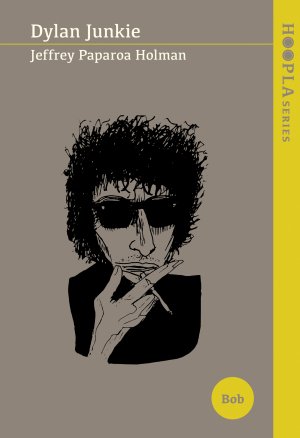 I have two forearms full already, but
if I was going to do another - ever - it would be William
Carden-Horten's cover image from Dylan Junkie, whizzed off first on a
coffee cup! He's amazing! Prolific doesn't even cut it, his sense of
line gets sharper and cleaner almost daily. Seen on a huge number of
Icebreaker products.
I have two forearms full already, but
if I was going to do another - ever - it would be William
Carden-Horten's cover image from Dylan Junkie, whizzed off first on a
coffee cup! He's amazing! Prolific doesn't even cut it, his sense of
line gets sharper and cleaner almost daily. Seen on a huge number of
Icebreaker products.
David Bowie sang, “Five years, that's all we've got . . .” You would spend them where, doing . . .?
What I'm doing now, writing my arse off as a state-sponsored scribe (aka, a superannuitant who writes). Hokusai the Japanese master artist who lived till ninety intending to make one hundred, claimed, "all I have done before I reached seventy is not worth bothering about". He called himself, "Old Man Mad for Art". I would like to be that too, Old Man Crazy for Poetry, for as long as I'm here. I want to be Here. Now. Then all is taken care of.
And finally, in the nature of press conferences in Japan, “Can you tell me please why your last book is your best work ever?”
I lived to see it done. Next please. Perhaps the best is yet to come?

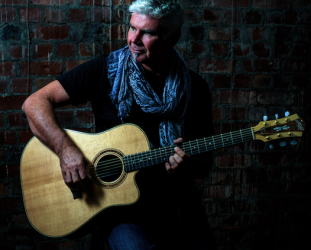

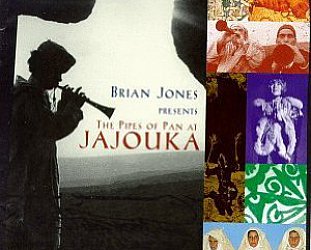
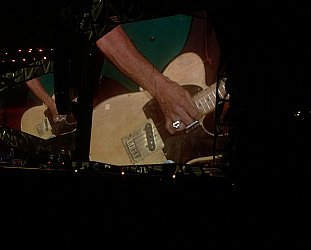
post a comment